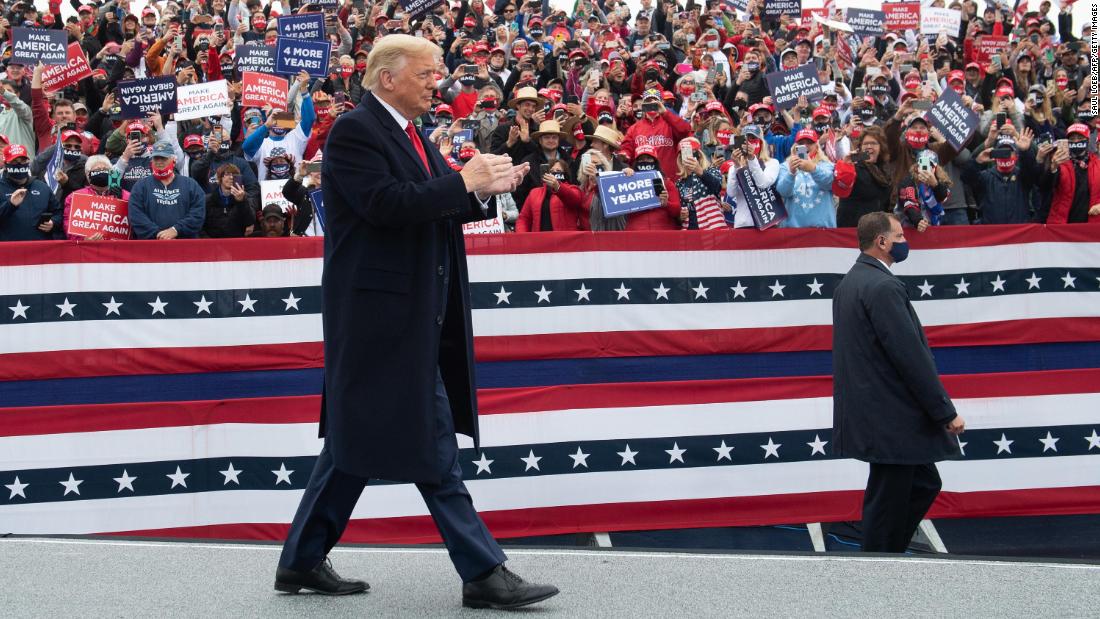
Witness this exchange between Trump and "60 Minutes" correspondent Lesley Stahl as part of an interview that ran over the weekend:
Trump: "Take a look. Yesterday we were in Arizona, record-setting rallies. Numbers of people like nobody's seen before."
Stahl: "You used to have bigger rallies."
Trump: "No, these are much bigger than I ever had--"
Stahl: "OK, I don't wanna bicker over that."
Trump: "You know, you're-- you're--"
Stahl: "Tell me about the mask wearing."
Trump: "--so negative. You're so negative. These are the biggest rallies we've ever had. You just come in here with that negative attitude. These are the biggest rallies we've ever had."
Here's the thing: Crowd size is not always indicative of, well, all that much. It suggests that some segment of your supporters are fired up enough to put aside their other plans for a day and turn out to a rally. But in an election in which some estimate upwards of 150 million votes will be cast, 10,000 attendees of a rally -- or even 50,000 -- is minuscule.
And that's even before we consider the coronavirus pandemic and the federal guidelines to avoid large groups and to remain socially distant. Plus, those warnings -- and the fact that more than 225,000 Americans have died from the disease -- have a significant effect on dampening peoples' enthusiasm to attend a rally.
So on the broad point, using the size of campaign rallies as a sign of support -- especially with an infectious disease raging across the country -- is deeply misguided.
But on the narrower point of just how many people are turning out to these Trump rallies, the President seems to be letting his imagination overtake the facts.
In Allentown, Pennsylvania, on Monday, local media reports said the crowd numbered in the "thousands." The crowd in Lumberton, North Carolina, for a Trump rally over the weekend was described as "a few thousand" in a local report. The largest recent rally crowd reported that I could find was for a Trump speech at The Villages in Florida last Friday, where the audience was estimated at 15,000. (Huge thanks to CNN's Betsy Klein for her help with Trump's recent schedule.)
While those crowds are impressive, they are a far cry from some of the larger crowds Trump drew during his 2016 campaign. The largest recorded crowd I could find was for a Trump event in Alabama in August 2015 when the reported attendance was 30,000. Which is double -- because math -- the largest recent crowd for Trump in this campaign.
(Sidebar: Trump's past claim that he drew bigger crowds than any other candidate ever is also not true. Barack Obama attracted an estimated 75,000 people to a May 2008 rally in Portland, Oregon.)
This is all, of course, par for the course with Trump. This is a man who forced his press secretary to insist that more people had attended his 2017 inauguration than had attended any previous presidential inauguration -- even though there was ample photographic evidence that such a claim was totally outlandish.
Why does Trump care so much? Because he thinks crowd size is somehow predictive of his chances of winning (it's not). And because he is obsessed with always being involved in only the "biggest" and the "best" things, even if he has to exaggerate wildly to make those fantasies come true.
It's an obsession for him, and a not very productive one. Given Trump's problem with the electorate -- particularly when it comes to his handling (and mishandling) of the Covid-19 pandemic -- the size of his campaign crowds is the least of his problems. Everyone seems to get that except him.
"crowd" - Google News
October 27, 2020 at 10:59PM
https://ift.tt/2HG9akE
Donald Trump is (still) totally obsessed with crowd size - CNN
"crowd" - Google News
https://ift.tt/2YpUyMI
https://ift.tt/2KQD83I
Bagikan Berita Ini














0 Response to "Donald Trump is (still) totally obsessed with crowd size - CNN"
Post a Comment